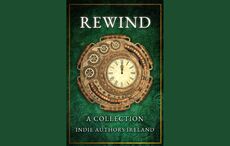| Jon Michaud |
Jon Michaud has watched the Northern Ireland peace process unfold from a particularly unique perspective.
“I happened to be in Belfast when the Good Friday accords were signed,” Michaud said in an interview this week. “You could feel the atmosphere shifting in the city.”
It’s not that Michaud is an immigrant who’d longed to escape the war-torn streets of 1980s Belfast. But he did know the war-torn streets of 1980s Belfast intimately.
This is surprising because, in many ways, Michaud is a quintessential New Yorker. In fact he works at The New Yorker magazine, where he serves as head librarian at the archives of the August weekly. He has also just published a New York novel which has earned strong reviews from The New York Times and Entertainment Weekly.
Entitled When Tito Loved Clara (Algonquin Books), the book is set in Manhattan and follows two Dominican American kids who were once high school sweethearts.
And yet, Michaud’s book is set in one of New York City’s most traditionally Irish neighborhoods – Inwood. For decades, the northernmost blocks in Manhattan were among the most Irish in the city.
In his famous book The Basketball Diaries, Jim Carroll moves in with Irish relatives in Inwood. The community also suffered a terrible blow on September 11 when Gaelic football player Damien Meehan, the son of Irish immigrants, was killed.
“There are still places where the Irish community manifests itself in Inwood,” Michaud notes. “The Irish bars along Broadway and also in the churches. Plus the nameplates outside many of the apartment buildings.”
Michaud came to know Inwood because it is where his Dominican-born wife had lived for some time. “Even before I moved in with her, I was immediately smitten (by Inwood). Even I cannot fully understand why. There’s lots of interesting stuff that feels undiscovered.”
When Tito Loved Clara is ultimately a touching story of love and loss, of wondering whether or not to stay in the old neighborhood or head out for the broader world.
This should be very familiar to anyone who grew up in Inwood or any other Irish enclave for that matter. But Michaud’s experiences with the Irish and Ireland extend much further than Inwood. His father, Michael, was a diplomat who served in numerous international hot spots.
_____________
Read more:
Photographer shot on second night of Belfast riots- VIDEO
Northern Ireland churchgoers protest Eminem’s planned concert in Bangor
Belfast City's peaceful protest murder of Northern Irish police officer - the past is another country
______________
“In 1980,” Michaud explains, “my father was appointed consul general in Belfast.” Michaud was just entering his teenaged years when his entire family moved into a Belfast which, at the time, was still wracked by The Troubles. “It was really transformative,” he says. Of course, it was also quite dangerous. “The troubles were in full swing. The hunger strikes happened when we were there,” he noted. Michaud’s father even received a death threat, for which he received round-the-clock guards and a bullet-proof car. And yet, for a young Jon Michaud, it was an eye-opening time. “It’s not unlike the way I felt up in Inwood. I just fell in love with the city of Belfast…I felt at home there. For a long time I could have seen myself moving to live there.”
Michaud’s school, Methodist College, was technically non-denominational, though it was majority Protestant. There was not much religious tension at the school, according to Michaud, though he saw plenty of problems during visits to the Shankill or Falls Road.
After Michaud’s father was done serving in Belfast the family returned to the U.S. Michaud, however, ached to return to Belfast.
Eventually Michaud talked his parents into letting him return for two more years. Michaud continued attending school and lived with friends. He still visits Belfast every three years or so, and he is planning an ambitious new book spanning Belfast’s recent decades.
Michaud says, “I think what my time in Ireland did was made me very sensitive to the ways that tension and hostilities between different ethnic and religious groups can manifest themselves.”
He’s planning to return to Belfast once again in the near future. Of the newly peaceful North he says, “I know it’s not perfect, but it has come a very long way.”
(Contact “Sidewalks” at [email protected] or facebook.com/tomdeignan)




Comments